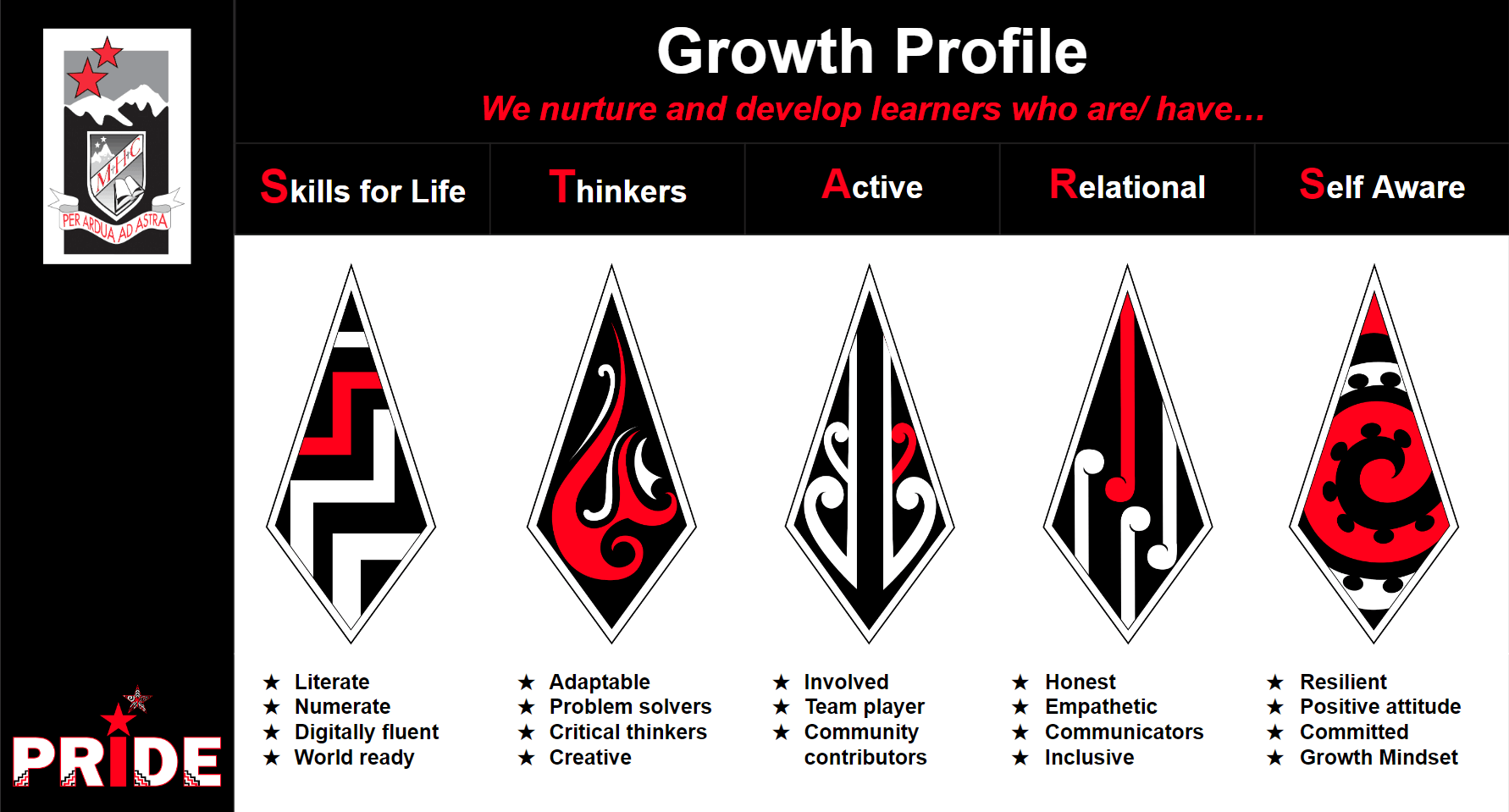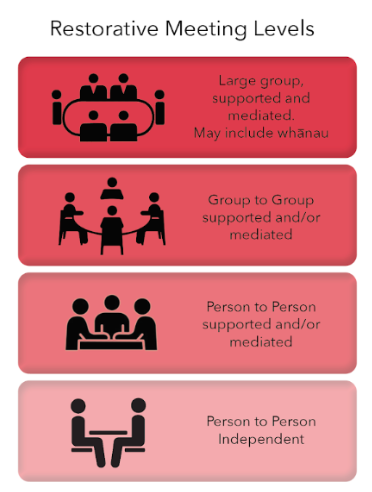Our mission at MHC, is to educate our young people. In the 21st century, this learning goes beyond the academic to include skills, attributes, values, social and emotional learning.
We call this MHC Learning Culture.
It encompasses all the things we want our young people to learn and develop.
MHC Learning Culture is committed to growing our young people, our values of PRIDE and the attributes in our Growth Profile, through learning experiences and opportunities based in strong learning-focussed relationships.
All staff are responsible for creating a learning culture in our school within their classrooms, with various teams having specific responsibilities to support them.

Our students, staff and wider community have contributed to develop a Growth Profile for the learners here at Mount Hutt College.
Our Growth Profile, see graphic below, identifies the key attributes, capabilities and skills that we want to nurture and develop in our graduates.
The features identified in the Growth Profile are weaved within our learning programmes and form the foundation of the new Manaaki model that is currently being integrated throughout the school.
As a community we see the features identified on the Growth Profile as critical to success, both at school and in the wider world, and are working on aligning our reporting model to integrate self and peer assessment and ensure our whānau have a better picture of individual progress against the Growth Profile.


The PRIDE Team oversees the day to day systems that teach and reinforce the behaviours we expect within our kura. Their mahi is aligned with Positive Behaviour for Learning (PB4L) practices to teach our school values of PRIDE - Passion, Respect, Integrity, Diversity, Excellence for All, and school-wide expected behaviours as outlined here (matrix)
The PRIDE Team is made up of a range of staff as well as student leader representatives. Within the PB4L framework, this is our Tier 1 Team.

Staff operate a stepped process within classrooms ranging from Step 0 to Step 4. At Step 0, staff put a lot of effort into getting to know the needs of all learners and adapting learning programmes to meet those needs, as well as building relationships with students. Steps 1 to 4 range from in-class consequences to being referred out of class.
For day to day oversight of students, the Kaiāwhina is the point of contact.
If Steps 3 or 4 occur, whānau are contacted by email.
Any patterns that emerge are followed up by the Pastoral Team.
Overall, We aim to focus our practice around the Restorative Approach so that learning can come from each situation.
The PRIDE Team also oversees the acknowledgement of students showing PRIDE in our school and the PRIDE Stamp System.
All students have PRIDE cards which operate like a coffee card. Students demonstrating PRIDE values can be rewarded with a PRIDE stamp by their teacher. Once their card is full they swap it for a 10-card with their Kaiāwhina. Their 10-cards can be saved up and used to order a variety of vouchers available at the Office. It is the student’s responsibility to keep their stamp and 10 cards safe. Most students stick them in their diary or pencil case.
For more information about Positive Behaviour for Learning visit https://pb4l.tki.org.nz/

As an educational organisation, our preference is always to educate first, founded in the following points:
- Wrongdoing is seen as a breakdown in relationships, required skills or expectations.
- Restoring relationships is important.
- Teaching of skills and expectations may be needed.
- Parties need support to move on and improve.
“Do the best you can until you know better. W hen you know better, do better.” – Maya Angelou
By using relational and positive behaviour for learning approaches to restore relationships and teach skills and expectations we stand a better chance of improving the capacity of the learner to return to ‘normal operations’ with an increased chance of success.
Through our MHC Learning Culture approach we seek to have all parties feeling heard, able to move forward and empowered to learn (academically, socially, emotionally) and return to that learning as quickly as possible.
At Mount Hutt College, we endeavour to utilise the restorative conferencing method when working with our learners. This could be at several different levels within our existing behaviour management system, and it is our preferred first step in rebuilding relationships between learners.
The restorative process seeks first to meet the needs of all parties, and to make things right. This is quite different to the kind of justice that has been dispensed in many schools in the past. Restorative practice philosophy recognises that when something wrong occurs, relationships can be damaged.
Young people rarely have any idea who they have hurt, or how badly, when they do the wrong thing, therefore need the opportunity to learn from their mistakes. This is a deliberate move away from punitive measures inflicted upon students that leave the wrong-doer feeling aggrieved.
As quoted:
“An eye for an eye leaves the whole world blind” – Mahatma Gandhi
A number of our wider staff, Deans, Kaiāwhina and Guidance Counsellors, have been explicitly trained in the restorative conferencing process, with more staff developing the skill set over time. The approach has an inquiry framework and results from best practice models found in modern approaches to student learning and wellbeing.
When engaging in restorative conversations, students can expect questions like those below.


